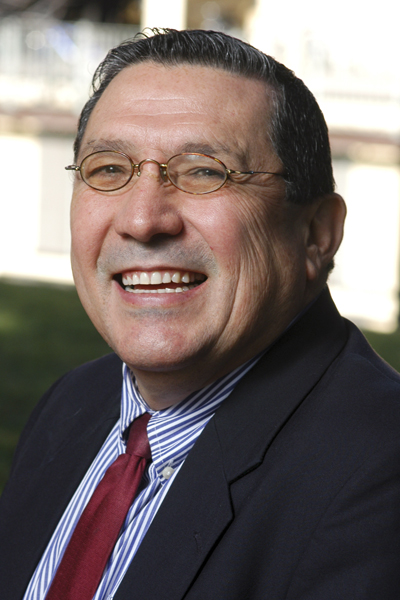First recipients receive President's Awards for Excellence Through Diversity
An associate dean devoted to increasing the number of female, black, Hispanic and Native American graduate students in the School of Engineering and a program that helps underrepresented minority students earn doctorates in the social, behavioral and economic sciences are the first recipients of the President's Award for Excellence Through Diversity.
At a Tuesday awards ceremony, President John Hennessy read citations honoring Noe Lozano, associate dean for student and diversity affairs in the School of Engineering, and honoring the program Enhancing Diversity in Graduate Education in the Social, Behavioral and Economic Sciences (EDGE-SBES).
The ceremony was held in the Citrus Courtyard, an octagonal garden of fruit trees in the northeast corner of the Main Quad.
Noe Lozano, who arrived at Stanford in 1983, was honored "for his unstinting efforts to increase the diversity of the student population in the school" and "for his generosity as mentor to students from underrepresented groups, his belief in their ability to succeed and his assistance in helping them obtain funding so that they may pursue their goals."
He was cited for "his enthusiastic partnerships with the various engineering diversity organizations—the American Indian Science and Engineering Society, the Society of Black Scientists and Engineers, the Stanford Society of Chicano Latino Engineers and Scientists, and the Society of Women Engineers—which have contributed to a supportive and open engineering community and inspired many to pursue engineering as a career."
Lozano also was honored "for the lasting contributions he has made to Stanford and the greater community, as evidenced by the many graduates he has assisted who have gone on to academic positions and leadership roles in government and industry."
In addition, he was cited "for the many ways he has made a critical difference in the lives of several generations of diversity engineering students during their time at Stanford."
Enhancing Diversity in Graduate Education in the Social, Behavioral and Economic Sciences is a multi-university collaboration funded by the National Science Foundation. At Stanford, the four-year-old interdisciplinary program has connections to the Center for Comparative Studies in Race and Ethnicity and the Institute for Research in the Social Sciences.
The program offers fellowships and one-on-one mentoring, and supports a yearly conference that allows its fellows to present ideas, obtain feedback and network with peers and professors at participating universities, including the University of Southern California, the University of Texas at Austin and Texas A&M University.
The program, which is led by Karen Cook, the Ray Lyman Wilbur Professor in the Department of Sociology, was cited "for its diligent efforts to recruit, retain and graduate outstanding students from underrepresented groups who are interested in academic careers."
It was honored "for seeking out partnership with administrative and departmental offices on campus so the university can offer the strongest funding packages ever to incoming students," and "for creating a scholarly interdisciplinary community where students can find and give support to each other through regular meetings, workshops and joint seminars with the Center for Comparative Studies in Race and Ethnicity."
The program also was cited "for encouraging EDGE [Enhancing Diversity in Graduate Education] participants to mentor incoming students and providing opportunities for professional development outside of Stanford" and "for the many ways in which it has promoted diversity in the professoriate and worked to make the university a more diverse institution."
The diversity awards, established earlier this year, were developed to honor individuals and programs that have made exceptional contributions to enhancing and supporting diversity, broadly defined, at Stanford. Usually, two will be given each year: one to an individual among the faculty, students and staff; another to a campus unit, such as a department, program or office.
The awards were created to recognize contributions to diversity in many aspects of university life, including recruitment programs, mentoring efforts, curricular projects, staff-development programs and community-building activities.



Share This Story